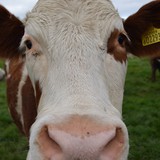Is it harmful to be a vegetarian
“You’re unbalanced feed”, “meat Probably eat up at night”, “in you all the soul rests”, — vegetarians and vegans are accustomed to hearing such comments at every step. But the Association of dietitians from different countries say: if you carefully watch the diet, vegetarian and even vegan diets can be balanced and they have a lot of advantages.

First you need to understand the terms. According to most classifications, vegetarianism is a broad term that includes several subtypes of diets. All vegetarians do not eat meat of mammals, birds and fish, but:
ovolactovegetarians eat dairy products and eggs.
lactovegetarians eat dairy but do not eat eggs.
ovovegetarians eat eggs, but not eating dairy products.
vegans don’t eat eggs or dairy products.
There are still pescatarians (do not eat meat of mammals and birds, but do eat fish), pollotarians (don’t eat mammal meat and fish, but meat-eating birds) and others. But the terms are often confused, so here we will only talk about ovolactovegetarians and vegano.
The main drawback of the diet with the absence of dietary meat and fish is that for some nutrients it is necessary to apply special efforts. This applies, for example, protein, omega-3 fatty acids, calcium, vitamin D, vitamin B12, iron, zinc and iodine. Let’s consider them in order.
Protein
Ovolactovegetarians receive a significant share of protein from dairy products and eggs. More difficult in this respect for vegans: protein in plant foods — legumes, grains, nuts, seeds — usually does not contain all the essential amino acids and not well absorbed.
See also Liam Hemsworth voted sexiest vegetarian of 2016
Liam Hemsworth voted sexiest vegetarian of 2016
In this situation, mostly soy (it has the most amino acids) and the combination of the maximum number of different protein sources throughout the day: so amino acids, which are lacking in some products will come from others.
In General, with proper planning, enough protein is available to all vegetarians.
Omega-3 fatty acids
Omega-3 fatty acids is complex: the most useful of which — eicosapentaenoic acid (EPA) and docosahexaenoic acid (DHA) — found in fish and seafood and have pescetarians.
In small quantities ovolactovegetarians can get these acids from eggs.
For vegans there are only less useful sources of α-linolenic acid (ALA) — flax seeds, wheat germ, walnuts, canola oil, soy and some others.
ALA is converted in the body into EPA and DHA, but it’s a slow process, the efficiency of which depends on genetic characteristics, age, health condition and other factors. If a person does not receive food enough EPA and DHA, it is recommended to double the normal intake of ALA. And pregnant and lactating women, the elderly and people with chronic diseases (e.g. diabetes) it is better to take supplements with EPA and DHA extracted from microalgae.
Read also Bears in the national Park “Taganay” became vegetarian
Bears in the national Park “Taganay” became vegetarian
Calcium
With calcium no practical problems ovolactovegetarians: in large quantity they can get it from milk and dairy products. Vegans are faced with the fact that calcium in plant foods (cabbage, turnips, broccoli, nuts, dried fruits), first, little, and second, it again is less digestible. The solution can serve as calcium-fortified soy milk, yogurt and cheese, cereal bars, muesli and juices.
To monitor the intake of calcium in the body vegans should very carefully: this element is fundamentally important for bone health.
A study conducted in the UK involving several tens of thousands of people showed that the risk of fracture in ovolactovegetarians and those who eat meat are about the same, while vegans have it above. It is particularly important to ensure adequate supply of calcium in the body for children, pregnant/lactating women and the elderly. If you are unable to obtain it in sufficient quantity of food, it is necessary to take special pills. Preferably with vitamin D, which encourages calcium to be utilized.
News 10 the crazy diets of the past — distant and not very
10 the crazy diets of the past — distant and not very
Vitamin D
Vitamin D is essential for bone health and has a number of other important functions. It comes from food and is synthesized with exposure to the sun. In food it is present in fish with high fat content (salmon, tuna, mackerel), gradually — in beef liver, cheese and egg yolk.
There are fortified with vitamin D milk, soy milk and cereals. If a person, especially a child, a pregnant/nursing woman or an elderly person, a little sun exposure and not getting the required amount of vitamin D from food, it makes sense to take it in supplements.
Vitamin B12
The biggest problem for vegans is vitamin B12. The fact that it is contained only in foods of animal origin (meat, fish, eggs, milk and its derivatives). And if ovolactovegetarians and the more pescetarian if you want to obtain the necessary amount of food, vegans must take a vitamin in pill or in large quantity to use artificially enriched food (for example, are the same cereal).
Iron
Unfortunately, iron from plant foods is also digested worse than iron from meat. Some substances — tannins (contained in tea and coffee), phytates (contained in legumes, nuts, soy, seeds) — hinder iron absorption, while vitamin C, for example, improves it.
Vegetarians can get iron from cereals (including, for example, specially iron-fortified morning cereal or bread), legumes, soy, leafy greens, dried fruit, wheat germ.
If you regularly use it all together with something that contains ascorbic acid (vitamin C), it is possible to achieve an adequate admission of iron in the body.
Zinc
The zinc contained in oysters, meat, milk and dairy products, whole grains, legumes, wheat germ, nuts. As in the case of iron, its bioavailability in plant foods is lower than in foods of animal origin, in particular, again, because of the proximity of piratami.
Vegetarians get significantly less zinc than non-vegetarians are, but in adults it usually has no significant effect on health — possibly due to compensatory mechanisms.
The concern is the possible lack of zinc in children, pregnant/lactating women and the elderly. Although the data are not sufficient to speak on critical zinc deficiency of these categories of vegetarians, theoretically, they could threaten growth retardation and increased risk of infections. Therefore, they should carefully monitor the intake of zinc in the body.
Iodine
And ovolactovegetarians, and vegans may not be getting enough iodine. It is contained in seaweed, seafood, milk and dairy products, eggs, grains, persimmon. To save from a deficiency in iodine can iodized salt and special additives (they are especially recommended for women of childbearing age, vegans).
The benefits of limitations and harm excesses
You need to understand that not all vegetarians are willing to carefully monitor the diet and daily consult with the recommendations for quantity of nutrients consumed.
“To see me often teenagers who are in the 12-13 years became vegetarian, says nutritionist European medical center Irina Russ. They do not accumulate bone mass, they have increased risk of fractures, they have poor muscle skeleton. Typically vegetarians do not store calculations, how much and what is eaten, and guided by my principles in the selection of products.”
News Scientists have figured out how to turn people to vegetarianism
Scientists have figured out how to turn people to vegetarianism
In Russia, vegetarians sometimes face still additional challenges — it is difficult to buy the necessary products — for example, fortified with vitamin D or B12 muesli, high-quality soy. In General, Irina Russ strongly against a vegan diet, especially for pregnant/lactating women and children. Although some diet restrictions, in her opinion, useful: “you Need have protein, but it needs to be easily digestible. The best in this regard recognized the Mediterranean diet: fish, dairy products, vegetables and vegetable fat, low meat”.
At the same time, major associations of dieticians (American, British, canadian) say that a carefully planned vegetarian, including vegan diet is healthy — in its observance it is possible to ensure intake of all required nutrients and it can adhere to, including pregnant and lactating women, the elderly, children, athletes.
There is plenty of evidence that vegetarians less likely to develop obesity, cardiovascular disease, cancer and diabetes of the 2nd type.
It is difficult to determine whether this occurs solely due to the diet plays an important role in lifestyle, which vegetarians tend to have regular physical exercise, abstinence from tobacco and alcohol, etc. In any case, without a conscious relationship to diet and lifestyle to achieve such results is difficult.
Karina Nazaretyan